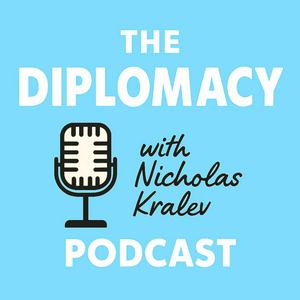13 episodes
- Guest: Marc Grossman, former U.S. undersecretary of state for political affairs and ambassador to Turkey
The world looks very different at the end of 2025 compared to the beginning of the year. How did diplomacy contribute to that difference, and what were the major diplomatic successes and failures?
On this episode of “The Diplomacy Podcast,” we discuss the Trump administration’s diplomacy, its highs and lows, and their impact on the world. My guest is Marc Grossman, former U.S. undersecretary of state for political affairs, assistant secretary for European affairs, director-general of the Foreign Service and ambassador to Turkey. He spent 32 years in the Foreign Service.
Having served as the State Department’s third-ranking official under Secretary of State Colin Powell, Grossman talks about what he learned during their daily 5 p.m. meetings. He also discusses the recent loss of expertise in the department, as a result of mass firings.
As always, my guest’s opinions don’t necessarily represent my own views.
Watch or listen to the episode above, or on one of these platforms: YouTube, Spotify, Apple Podcasts.
This is a public episode. If you would like to discuss this with other subscribers or get access to bonus episodes, visit nicholaskralev.substack.com - Guest: Kate Byrnes, former U.S. ambassador to North Macedonia and deputy chief of mission in Greece
The Institute of International Education reported last month that new enrollments of foreign students at U.S. colleges and universities decreased by 17 percent this fall compared to the same time last year.
On this episode of “The Diplomacy Podcast,” we discuss what that means for the future of U.S. education, science, economy and soft power. My guest is Kate Byrnes, former U.S. ambassador to North Macedonia and deputy chief of mission in Greece. She spent 32 years in the Foreign Service, most recently as a senior foreign policy adviser to the commandant of U.S. Europe Command in Stuttgart, Germany.
Byrnes also talks about the tension between free speech and visa policies. She explains the historical role of educational and cultural exchanges in U.S. public diplomacy, and their impact on foreign publics’ perceptions of and trust in the United States.
As always, my guest’s opinions don’t necessarily represent my own views.
Watch or listen to the episode above, or on one of these platforms: YouTube, Spotify, Apple Podcasts.
This is a public episode. If you would like to discuss this with other subscribers or get access to bonus episodes, visit nicholaskralev.substack.com - Guest: Charles A. Ray, former U.S. ambassador to Cambodia and Zimbabwe and former deputy assistant secretary of defense.
The U.S. military and the Foreign Service are two parts of the same national-security apparatus, but that may be where their similarities end. Their cultures, missions and approaches to those missions are very different — and often exactly the opposite.
On this episode of “The Diplomacy Podcast,” we discuss those differences with someone who has experienced both — first as a soldier in the U.S. Army for 20 years, and then as a career diplomat for three decades.
My guest is Charles A. Ray, a former U.S. ambassador to Cambodia and Zimbabwe, and former deputy assistant secretary of defense. He now teaches at the Washington International Diplomatic Academy and chairs the Africa program of the Foreign Policy Research Institute.
Ray also talks about the U.S. strikes that have killed dozens of civilians on boats in the Caribbean and the Pacific, which the Trump administration claims are smuggling drugs to the United States, though it hasn’t provided proof.
As always, my guest’s opinions don’t necessarily represent my own views.
Watch or listen to the episode above, or on one of these platforms: YouTube, Spotify, Apple Podcasts.
To support the podcast with a donation, click here.
This is a public episode. If you would like to discuss this with other subscribers or get access to bonus episodes, visit nicholaskralev.substack.com - Guest: Tom Countryman, former U.S. assistant secretary of state for international security and nonproliferation
The Trump administration has done an excellent job inundating us with all kinds of news, pronouncements and orders. But lately, I’ve found myself wondering what sleeper threats to U.S. and global security are not making headlines. So I asked an expert.
On this episode of “The Diplomacy Podcast,” we discuss hidden risks for both the United States and the world. My guest is Tom Countryman, former U.S. assistant secretary of state for international security and nonproliferation. He spent 34 years in the Foreign Service and currently chairs the board of the Arms Control Association, a Washington think tank.
Countryman worries that we are not practicing the diplomacy necessary to avert an armed conflict with China, and to preempt an erratic reaction by Russian President Vladimir Putin should he lose his war against Ukraine. Countryman is also concerned about the Trump administration’s air strikes on boats in the Caribbean and the Pacific without evidence to back its claim that they were smuggling drugs.
As always, my guest’s opinions don’t necessarily represent my own views.
Watch or listen to the episode above, or on one of these platforms: YouTube, Spotify, Apple Podcasts.
This is a public episode. If you would like to discuss this with other subscribers or get access to bonus episodes, visit nicholaskralev.substack.com - The Trump administration has won much praise for brokering a deal between Israel and Hamas to stop the war in Gaza. The ceasefire has proven very fragile, and three senior U.S. officials are currently in Israel to bolster it, following Trump’s visit there last week.
On this episode of “The Diplomacy Podcast,” we discuss the deal’s chances of full success, and what it means for the future of the decades-long Israeli-Palestinian conflict. My guest is Danielle Pletka, distinguished senior fellow in foreign policy and defense studies at the American Enterprise Institute, a conservative think tank.
“By itself, architecturally, it’s a great deal,” Pletka says. “Execution-wise, there is nothing to it. But of course, that’s not Donald Trump’s problem. That’s the problem with every single deal that’s ever taken place in the Middle East that has involved the Palestinians, that has involved terrorist organizations, which is, execution doesn’t happen. The ceasefire is already falling apart. I suspect that the rest of this goes in fits and starts — fundamentally nowhere.”
She also believes that the deal would not have happened had Israel not bombed a site in Qatar where it thought Hamas leaders had gathered.
This is a public episode. If you would like to discuss this with other subscribers or get access to bonus episodes, visit nicholaskralev.substack.com
More Government podcasts
Trending Government podcasts
About The Diplomacy Podcast
How diplomacy shapes our world — and our lives nicholaskralev.substack.com
Podcast websiteListen to The Diplomacy Podcast, Life and Law with Siphosihle Nkosazana Mbuli and many other podcasts from around the world with the radio.net app

Get the free radio.net app
- Stations and podcasts to bookmark
- Stream via Wi-Fi or Bluetooth
- Supports Carplay & Android Auto
- Many other app features
Get the free radio.net app
- Stations and podcasts to bookmark
- Stream via Wi-Fi or Bluetooth
- Supports Carplay & Android Auto
- Many other app features


The Diplomacy Podcast
Scan code,
download the app,
start listening.
download the app,
start listening.


















